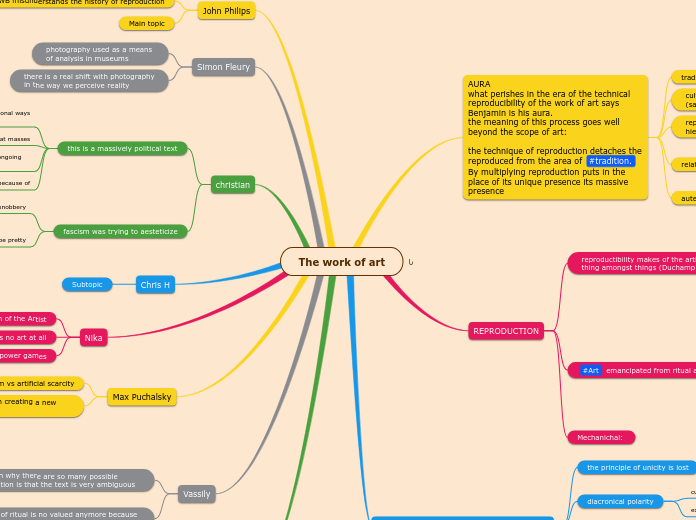作者:Simona Ferlini 2 年以前
284
The work of art

作者:Simona Ferlini 2 年以前
284

更多类似内容
the aesthetic aspects took over religion from contemplation this can give the individual a lot, but at wb times this kind of contemplation had degenerated
mechanically mediated
the immediacy of nature or the immediacy of reality becomes a mirage: through film mounting it becomes apparent that reality is a social construction art becomes a powerful tool for social mediation, for the production of collective meaning.
this transformation affects the experience of all reality not only artistic aesthetic facts precisely because the traditional territory of art explodes, the art world explodes
the dynamite of the tenth of a second,
"By close-ups of the things around us, by focusing on hidden details of familiar objects, by exploring commonplace milieus under the ingenious guidance of the camera, the film, on the one hand, extends or comprehension of the necessities which rule our lives; on the other hand, it manages to assure us of an immense and unexpected field of action. Our taverns and our metropolitan streets, our offices and furnished rooms, our railroad stations and our factories appeared to have us locked up hopelessly. Then came the film and burst this prison-world asunder by the dynamite of the tenth of a second, so that now, in the midst of its far-flung ruins and debris, we calmly and adventurously go traveling. With the close-up, space expands; with slow motion, movement is extended. The enlargements of a snapshot does not simply render more precise what in any case was visible, though unclear: it reveals in them entirely new structural formations of the subject. So, too, slow motion not only presents familiar qualities of movement but reveals in them entirely unknown ones 'which, far from looking like retarded rapid movements, give the effect of singularly gliding, floating, supernatural motions." Evidently a different nature opens itself to the camera than opens to the naked eye--if only because an unconsciously penetrated space is substituted for a space consciously explored by man. . . . . The camera introduces us to unconscious optics as does psychoanalysis to unconscious impulses." (236-7)
changes in time and space
not anymore a #fetish, gets rid of the myths of creativity, empathy, autenticity ...
Benjamin takes both art and philosophy out of their traditional context / borders, out of their conceptual territory, abandon of the traditional objects and themes of the philosophical discourse
Connection with Passagenwerk
radically reconfigures the meaning and nature of the philosophical exercise, a sinking of thought in the most humble materials, and also and above all in the existences of the vanquished, the prostitute the worker (as expressions of the commodity #fetish)
pays attention to what appears to history as secondary,
save the phaenomenons in the moment when they happen, to find the traces of a higher life - this can be done ONLY in an epoch freed of #magic
Brecht's comment: the expectation that what we are looking at will in turn return to us the gaze generates the aura. Benjamin discovered this by analyzing cinema. Everything is mystical in this attitude contrary to mysticism.